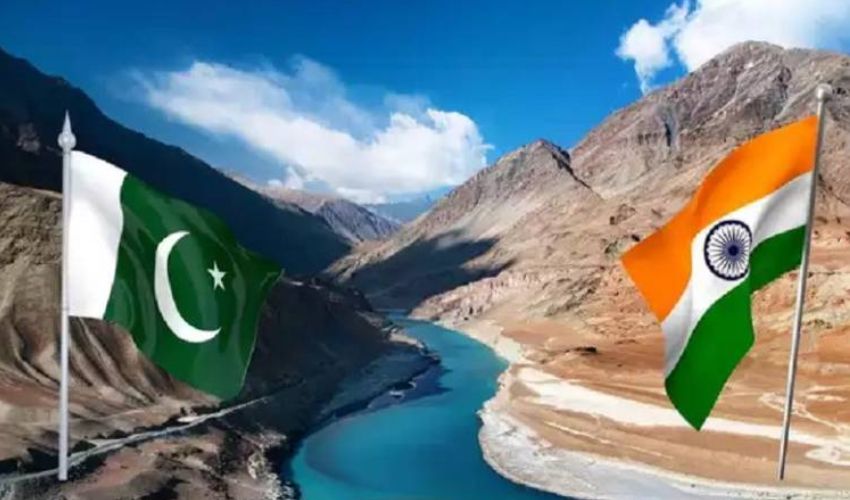A high-level meeting of the National Security Committee (NSC), held in Islamabad under Prime Minister Shehbaz Sharif, has concluded its emergency session.
The high-level meeting was attended by all services chiefs, including the Chairman of the Joint Chiefs of Staff Committee. According to official sources, the forum thoroughly discussed the prevailing security environment, particularly focusing on India’s hostile posture and provocative actions.
Sources revealed that the committee was given a comprehensive briefing on the operational preparedness of Pakistan’s armed forces in the event of any Indian aggression. Expressing satisfaction over the current state of military readiness, the NSC reiterated that any misadventure by India would be met with a full-force response.
Also Read: India will pursue Pahalgam attackers to 'ends of earth': Modi
The meeting also deliberated on India’s attempts to unilaterally revoke the Indus Waters Treaty. The committee was informed that India does not possess the authority to terminate the treaty unilaterally, and Pakistan is well within its rights to raise the issue at relevant international forums.
In response to the decision to expel Pakistani diplomats from India, the NSC resolved to take appropriate diplomatic steps. The committee hinted at engaging global institutions to address India's unilateral actions on both diplomatic and water-sharing fronts.
Emphasizing restraint and responsibility, the committee maintained that Pakistan would respond with maturity but firmly defend its sovereignty and rights under international law.
The NSC meeting follows India's suspension of the 1960 Indus Waters Treaty and the closure of the Attari-Wagah border. India’s actions have drawn widespread criticism, with Pakistani officials describing the move as both hasty and unjustified.
Indian actions in Pahalgam and IWT
The Prime Minister's Office confirmed that the NSC would focus on Pakistan's response to India's recent actions, including the suspension of the Indus Waters Treaty. Defense Minister Khawaja Muhammad Asif condemned India's decision, asserting that such unilateral actions violated international agreements. "India cannot simply revoke the treaty. It is a multilateral agreement, involving other parties beyond India and Pakistan," Asif stated.
Also Read: Pakistan to respond to India's actions comprehensively: Dar
The Indus Waters Treaty, which has governed the sharing of river water between the two countries since 1960, is now at risk of unraveling. The Indian government's decision to halt the treaty follows the false flag operation in Pahalgam, a move that has raised suspicions of Indian agencies' involvement in orchestrating the attack.
Khawaja Asif and other key figures respond
Khawaja Asif, speaking to the media, emphasised Pakistan's readiness to provide a "substantial response" to India’s provocative actions. He likened the current situation to the 2019 confrontation following the downing of Indian pilot Abhinandan Varthaman. "Just as we responded decisively during the Abhinandan incident, we are prepared to take appropriate action should the situation escalate," Asif affirmed.
While Pakistan seeks a measured response, Asif highlighted the longstanding Indian desire to terminate the Indus Waters Treaty, citing reports that India has been contemplating such a move for over a decade. "India has continuously sought to withdraw from the treaty, but this cannot happen without consequences," he said.
India’s aggressive stance
The Indian government’s actions have extended beyond the waters dispute. Indian authorities announced the cancellation of visas for all Pakistani nationals and ordered Pakistan’s diplomatic staff, including the air force and navy attaches, to leave the country.
The spokesperson for India's Ministry of External Affairs also stated that the Pakistan High Commission would have to vacate India within seven days, while the Integrated Check Post at Attari would remain closed until further notice.
Also Read: What is Indus Waters Treaty that India suspended? Find out here!
India's decision to suspend the Indus Waters Treaty is presented as a response to what it claims are Pakistan's links to cross-border terrorism. Indian Foreign Secretary Vikram Misri stated that the treaty would remain suspended until Pakistan “credibly and irrevocably” halts support for terrorism. The suspension has triggered outrage in Pakistan, with officials describing it as an unjustified escalation in an already volatile region.
Diplomatic channels remain open, but tensions rise
While the NSC prepares for today’s critical meeting, diplomatic sources suggest that Pakistan remains open to dialogue but insists that India’s actions have undermined the spirit of bilateral cooperation. "Pakistan is not inclined to make rash decisions. We seek a thoughtful, strategic response," said Asif, underscoring the importance of international law in the dispute.
Defense Minister Asif also reiterated Pakistan's stance that if India escalates the situation, Pakistan is prepared to act in accordance with international law. He expressed hope that the situation could be diffused through diplomacy, but warned that Pakistan would not hesitate to defend its interests if provoked.
Also Read: India suspends Indus Waters Treaty, expels Pakistanis, closes Attari post
Despite internal political differences, all major political parties in Pakistan have rallied behind the government’s response to India’s provocative actions.
Prime Minister Sharif's call for a National Security Committee meeting reflects a unified stance on national security matters, as leaders across the spectrum have expressed support for a firm response to India’s provocations.
In a statement, the Prime Minister's office stressed that the government would not be swayed by external pressures and would act decisively in the best interests of the country. "The security and sovereignty of Pakistan is non-negotiable, and every possible action will be taken to protect our national interests," the statement concluded.


























